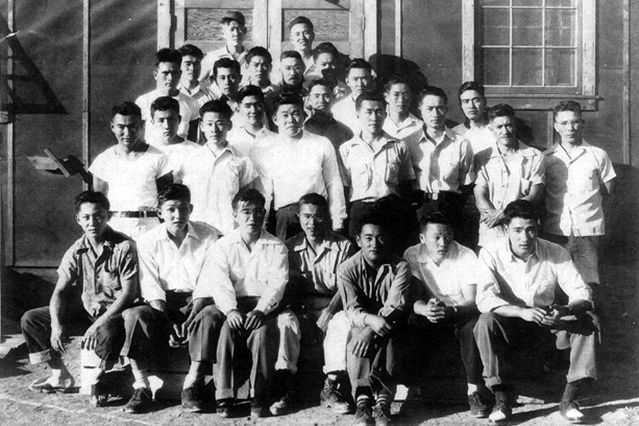Suyama Project gives voice to Japanese American experiences

Photo courtesy of Suyama Project
By Denise Lin
Jan. 21, 2016 10:09 a.m.
The Suyama Project, a UCLA Asian American Studies Center endowed research project was started in 2014 to give a voice to Japanese Americans’ experiences during World War II. The project is named after Eji Suyama, a Japanese American combat veteran who became a doctor after the war.
TRANSCRIPT:
LIN: It’s been 70 years since the end of World War II, but many stories of Japanese American experiences during the war are still emerging. The Suyama Project, a UCLA Asian American Studies Center research project endowed by an anonymous donor, was started in the fall of 2014 to give a voice to the stories of World War II renunciants, like 95-year-old Bill Nishimura.
Before the war, Nishimura was proud of his citizenship, but came to distrust the government as he was denied his civil rights.
NISHIMURA: When the war started, I always trusted America.
LIN: However, Nishimura believed his friends were betrayed by the Japanese American Citizens League and the U.S. government. The JACL told Japanese Americans that they would be able to find work outside of California, which was not the case.
NISHIMURA: JACL had a meeting at the Gardena Buddhist Church and told us that in the U.S. outside of California, there is so much work.
They had the hardest time to find a place to live.
That’s when I thought you cannot trust the JACL nor the United States government anymore. Whenever government made a statement, I didn’t take it lightly. I read it over and over, what is the U.S. trying to do to me? That’s the attitude I tried to take.
LIN: Professor David Yoo is an adviser for the Suyama Project.
YOO: My name is David Yoo; I’m a professor of Asian American Studies and a director at the Asian American Studies Center. The project is about dealing with the notion of resistance, broadly understood by Japanese Americans during World War II.
LIN: Since it has been many decades since the war, it is becoming even more important to people like Dr. Yoo to preserve stories as people pass on. The Suyama Project has been working to collect photos, conduct interviews and public programming, and otherwise reach out to Japanese American communities. The project emphasizes the experience of resistors, or people who renounced their citizenship, refused to answer the loyalty questionnaire or otherwise protested treatment by the U.S. government.
YOO: For the resistors … there’s a whole range of resistance, including those who may have been engaged in what we called everyday resistance.
LIN: Nishimura himself resisted the acts of the U.S. government by refusing to answer an American loyalty questionnaire.
NISHIMURA: My dad was apprehended by the FBI when the war started. They even released him after 2 years of separation from the family; he came back.
They asked, how do you feel that your dad is back with the family? He continued and said, now that your dad is back with your family, how do you feel about answering those questions? So I replied, “Since you have not restored my civil rights, as I have mentioned in the questionnaire, I refuse to answer those questions.”
Oh my gosh, he really burned up. He yelled at me. At that time, he decided to send me to Tule Lake.
LIN: After the war, some of these kinds of stories became buried as Japanese Americans had to focus on rebuilding their lives.
YOO: For many Japanese Americans, because the war was so painful, the best way they decided to move forward was to focus on the future.
LIN: Despite that, the public programs conducted by the Suyama Project have received positive feedback.
YOO: It’s given people a chance to tell their stories. In some cases, these stories are not very well-known. Sometimes, even the family members of the people who went through it are maybe hearing it for the first time.
LIN: More stories like Nishimura’s can come to light through the project. The website for the Suyama Project is www.suyamaproject.org, where there are archived materials, such as letters to the editor.
For Daily Bruin Radio, this is Denise Lin.


